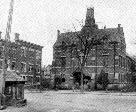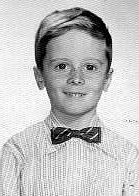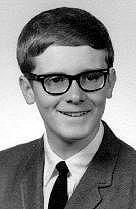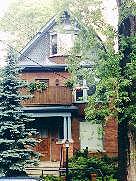|
Promiscuous |
|
New England Gothic
Town Hall, Ayer, Mass:
So who's a Good Boy then?
|
In little towns around us, kids sat in class with their next door neighbours. Around me from the 1st grade were kids who'd lived in Stuttgart, Okinawa, even -- as one little 3rd grader told us in show & tell -- "New Found Land."
1969
My life in The Bar didn't begin in 1969, but it was the year I came to the town where that life would begin. Who I was then had of course been shaped by the 19 years that had come before.
I was born in January 1950, a second child but, the first having died, growing up big brother to six later siblings. My father, not yet 21 when I was born, worked in a lumber yard. It grew, he in time its vice president. He was from West Virginia, having escaped his likely fate in a pottery or coal mine via the US Army.
My mother, 22 then, was one of eight children, four girls, four boys, raised on a World War One pension by an eccentric inventor and his long suffering wife (dead of exhaustion at 65; he outlived her by 19 years). She had grown up in the same town I would: Ayer, Massachusetts.
Ayer, 35 miles northwest of Boston, had only two things to distinguish it. First, unlike the classic New England towns nearby -- dating from the 1630s, with town halls and churches, all white, set on pretty green commons -- Ayer was a tawdry place. Born of the railroad as South Groton Junction, it was carved off as a town on its own only in 1871, named for its chief benefactor.
It had not a common but a main street, just one, its older buildings not colonial but red brick Victorian, its newer ones banal. There were dusty rail crossings, a big junkyard full of rusting cars, a river so polluted by the upstream pulp mills in Fitchburg that, as local legend had it, you'd die instantly if you fell in.
Nonetheless I grew up there a Very Good Boy. Under the scrutiny of my extended maternal family, maybe I had to be. But I was a serious child from the start: my aunt Alice said I'd been born 40 years old. I was babysitting my brothers and sisters well into the night by the time I was 10; my mother knew I could do it but hinted not to tell the neighbours.
I hung around the library, the only beautiful building in town. I studied hard. In the 8th grade I was on a TV science quiz show, a pudgy teenager in horn rim glasses. I won a bicycle. I rode it every day to my after school job, a janitor, my father my boss.
In high school I was on the student council, graduated fifth in a class of 200. At home I drew house plans (an architect never to be), watched The Monkees (they were cute), listened to My Name is Barbra (can't stand Streisand now). I knew all the lyrics to West Side Story (still do) -- but when my father heard Hair's ("sodomy, fellatio...") he smashed the LP. I didn't smoke or do drugs; was 18 before I even tasted booze. Hated gym. All as you might expect.
I didn't date as my sister a year younger did. I wanted to: I'd been attracted to boys from the 6th grade at least; I know because I still remember a boy in 6th grade, so fascinating I'd quiver just walking by his house. I lusted after men even when I didn't know what lust was, those men likely all of 19, counsellors in my one stint at summer camp. I was 12. I remember them all, their faces and bodies, still.
But no one else knew any of this -- except maybe a boy a few years younger who liked having his cock sucked. I say maybe because I doubt even he knew what that might be taken to mean. He later got married.
Ayer's second distinction had come during World War One, when a big US Army post was planted at the west end of town. Fort Devens would become the biggest military installation in New England. And it would shape my life.
Without Fort Devens I would not have been born: my father was stationed there when he met my mother in 1948. Nor would I have got the education I did. Three quarters of Ayer's school kids were Army dependents with Army money (lots of it, the Cold War on) lavished on their schooling, we local kids just along for the ride.
In 1963, just in time for my freshman year, the new Ayer Junior Senior High School opened, sprawlingly modern and generously equipped. In a town with only 4,000 civilian inhabitants, that school had 1,200 students. Its auditorium could hold us all at once, the stage vast, the lighting system state of the art. We did big Broadway shows there, I a techie and minor thespian.
In those little towns around us, kids sat in class with their next door neighbours. Around me from the 1st grade were kids who had lived in Stuttgart, Okinawa, even -- as one little 3rd grader told us in show & tell -- "New Found Land." They were a smart, socially skilled lot, most of them. They had to be: every three years or so they were uprooted and shipped off someplace new. They had learned to find their feet quickly.
|
Virtual Vietnam
TTC on the Nashua
|
The Cold War & its proxy hot ones came by TV into every living room in America -- but they were also in my own backyard. The draft hung over me & every boy I knew.
In air raid drills we were taught, as were kids all over the country, to "duck and cover," huddled in halls at school. Civil Defense was a hoax nearly everywhere, but with a nuclear ground zero just a mile away it was clearly absurd. Even a 12 year old, as I was during the Cuban Missile Crisis, knew that.
Out my bedroom window at night I could see war and hear it, or rehearsals for it, just over the next hill: sudden flashes in the sky; the rattle of machine guns and the thud of heavier fire. Giant twin rotor helicopters roared over our heads while we played. We were given school tours of the Fort's "Vietnam Village," the stinking Nashua River meant to stand in for the Mekong Delta.
On one of those tours our guide, a drill sergeant with a cruel Southern accent, made me wince: very soon, I thought, your life will be in the hands of some fool like this. The draft hung over me and every boy I knew.
That wasn't an immediate worry for me until 1969. From Ayer High's cosmopolitan rigour I had gone to a state college so parochial it might well have been South Boston High. I'd had to work hard in high school (and got voted "Most Studious" for it); at Boston State I sailed along at the top of my class with a lack of effort often embarrassing.
I hated it but I could afford it, tuition just $200 a year. And it gave me a 2-S draft deferral, safe as long as I was a student. But by September I might not be. My father had got a job in Vermont; the family moved there in August. I became a Massachusetts non- resident; my tuition would triple. I was covering it myself on summer jobs that paid, tops, $1.90 an hour, and now there was rent too, for grotty rooming house digs in Cambridge.
Maybe I could have swung it but by then I didn't want to: the school was crap; the future dubious. I had already been reading about Canada by then, had sent for information from the Toronto Anti- Draft Programme, got an immigration form at the Canadian Consulate in Boston and had already filled it out.
On September 16, 1969, 3:35 pm, I boarded a Northeast Airlines DC-9 at Logan Airport, bound for Montreal. I had only a small bag and my portable typewriter, all my immigration papers in a manila envelope taped to the top. I looked back at Boston as we flew out, sure I'd never see that city (which I loved), or that country (which I did not), ever again.
Immigration to Canada was based on points: so many for age (lower the better), education, language skills, labour demand wherever one meant to settle, and a firm job offer.
I needed 50 out of 100 points to qualify. I had visited Toronto on September 2 and in just two days got a job offer -- confirmed by telegram just in time: the morning of September 16. I had tried learning French but didn't have enough to be worth any points. I figured I had 46 for sure.
At Dorval Airport a handsome young man in an official blue blazer with bright brass buttons looked over my application. He passed it back across the desk: I had to sign it. Worried, I asked if I could apply again if I were turned back. He gave me an odd look. "Do you want to withdraw your application?"
I was sure I had blown it. I took a deep breath, said "No," and signed.
He smiled slightly: "No problem." Canadian immigration officers, at their own discretion, could add points based on their personal impression of an applicant. I must have looked a Very Good Boy that day: my final total was 55.
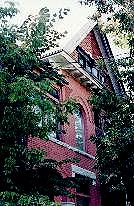
Room at the top
|
After just three months in Toronto, I knew I'd never be drafted. But I also knew I'd found the right town.
In October I got permanent landed immigrant status. I sent my draft board a change of address and under my signature wrote: "Formerly 19 100 50 11" -- my draft card number. I tore that draft card in half, taped it to my copy of that letter and put in up on a wall of my room. I heard not a peep.
In June 1970, wanting to visit friends I'd met here but who lived in Buffalo, I would peep, calling my draft board. "Oh," the woman there said, "you're the one who went to Canada." (It was a small town.) "We didn't know what to do with you. What does landed immigrant mean?" I explained; she cheerily said they'd change my status to 1-A, immediately draftable.
But by then I wouldn't be draftable at all. In December 1969 the US Selective Service had held its first draft lottery, meant to give 19 year olds some sense of their chance of being called up. Birthdates picked at random were assigned numbers, the higher the number the less the risk, those in the top third sure to escape. My number was 324. I was free. I could go back if I wanted to.
But I didn't want to. Just three months in Toronto had told me I'd found the right town. In five years I could apply for Canadian citizenship and would, right away, swearing my oath of allegiance to the Queen on April 30, 1975. I'd be home in time for the six o'clock news: people clinging desperately to the last American helicopters lifting off from the roof of the US embassy in Saigon.
My first day as a Canadian citizen would be the last day of the war in Vietnam. I've said ever since that it was an irony so pat you could never get away with it in fiction.
Twenty eight years after I left, I'd get to see my little home town and its big Army base once again. I'd be there unexpectedly, my father killed in an accident, bringing all my siblings together for the first time in years. Two of my brothers and I would drive to the Fort and tour the sights of our childhood.
We'd find its gates unguarded, Fort Devens sprawling behind them perfectly intact -- but with almost no one there. It had been mothballed, preserved as if in amber; an unintended museum of the Cold War and of my own early life.
Years before, a poet who lived in the town south of Ayer had written a piece that began: "The guns at the Fort have stopped." He called it "Peace Comes to Still River, Mass." And at last it would. On that day in September 1997, I wouldn't quite know why it still mattered to me. But I'd find that it did.
Steve would be the first person I'd ever come out to, a literal rite of passage: I'd had to leave home to do it.
The place that had hired me was The Book Cellar. I had lucked out: not only had they opened a new branch needing new staff just days before I showed up, but it was one of the best bookstores in the city. Its range of international periodicals was unequalled then, its poetry section packed, its clientele not just readers but writers, editors, publishers. In time that would come in handy.
In my first week there a handsome young man with green eyes and curly blond hair introduced himself, his opening: "Are you from the States?" I'd been going on about something in the store you couldn't get in the States; he'd overheard and -- Canadian chauvinist that he was (as I soon would be) -- his interest had been tweaked.
His name was Steve. He was 19. He asked me out for coffee and I went. Steve told me he was in a play, in Hamilton, and invited me to go with him to see it.
A week later we drove down with the director, Martin Brenzell, a man Steve's friends called "affected." Even I, utterly untutored, knew right off -- maybe it was the big pink hat -- that he was an outrageous queen. A story he told made it clear he'd been one for ages. As a child he had done shows in his garage; a neighbour had politely asked if they were amateur shows. Martin shot back: "Amateur! How pedestrian." This at seven years old.
In the theatre Steve introduced me to someone in a big black cape, named Flav, also 19. Steve's friends didn't call him anything but Flav: they knew he was gay and liked him and who wouldn't? His flamboyant self assurance could seduce anyone.
The play was called The White Whore and the Bit Players, its music the Mass in F Minor by the Electric Prunes (I knew it; I'd had the record). Steve was one of the bit players, for me the most entrancing. I sat watching him, holding his jacket and sandals in my lap -- and of course falling madly in love.
A few weeks later I told Steve I was gay, the first person I had ever come out to. That rite of passage was for me -- as I suspect for many gay people -- a literal one: I'd had to leave home to do it.
Steve was an outrageous flirt but he was not gay. Or so he said then: years later I would see him out in the bars, but by then we weren't speaking. He was not my introduction to the gay world, despite Martin and Flav; I wouldn't see them again any time soon.
But he was my entrée to the world as gay myself. Everyone he introduced me to soon knew. His roommates, students sharing a few rooms on Bedford Road, their girlfriends often there too, took it as nothing special.
In time Joe, Enzo, Steve (another Steve: thin, genial, with a big nose and frizzy hair) and his girlfriend Wendie would be my roommates: when they found bigger digs at 69 Walmer Road they asked me to move in. In place of Steve: they hadn't been getting on with him. Having cast my lot I soon wasn't either -- hence that later chill in the bars.
|
Sixties crash pad
If a lovely one:
|
I first kissed a boy at Walmer. But in my journal then I wrote:
"I swear abstention, total & absolute, before I'll ever go near the fag section downtown. It's inhuman."
The boys had sex with the girls; the boys did not have sex with the boys or the girls with the girls. But there was lots of ambient eroticism: giggly, stoned play wrestling; people careless about clothes; even simple cuddling. Joe, sitting with me one night listening to records, snuggled down and put his arm around me. "How," he asked, "does one go about holding you?" A serious man, Joe. I'd later be a guest at his wedding.
Flav had gone off to Vancouver but was back by late December and dropped in often, once bringing with him, for the night, a ratty little boy named Billy. He was 19. (It seemed we were all 19.)
Flav left the next morning but Billy stayed through the day and sometimes came back. He and I spent hours talking about being gay -- or rather his being gay: he was the one who really knew about it. He was the first boy I ever kissed with intent. He was all tongue. But it didn't go beyond that -- then.
Much as I liked Billy, I found him a sad case. In my journal I wrote that he was "well on his way to becoming one of those downtown queens, even though he's perhaps just a bit too bright for that." Of course I was too: "I swear abstention, total and absolute, before I'll ever go near the fag section downtown. It's inhuman."
I knew Toronto's "fag section" because nearly everyone did. Even kids from the burbs could find The St Charles and The Parkside. On Halloween they poured in to see drag queens prance from one to the other, open targets for well aimed eggs.
I'd walked by these places, unavoidably: they were a block apart on Yonge Street, the city's main drag. I'd seen a few of their denizens hanging around outside. In my journal I called them "snaggle toothed fags." Flav once said he wouldn't wish homosexuality on his worst enemy.
Yet in time we'd be denizens ourselves, endlessly out at The Parkside. For now, though, there was no encouragement. What gay life the few gay people I knew by then had seen, they found depressing, ugly, repellant.
Besides, we were just 19. The legal drinking age was 21. There was a song then with a haunting chant, one word repeated over and over: the average age of American kids getting killed in Vietnam. Nineteen.
The Vietnamese kids, many of them, were quite a bit younger.
For details on my life before Canada (written after the above)
see An American Education (Short of Yale)
Go on to 1970
Go back to: Contents page / My Home Page
This page: http://www.rbebout.com/bar/1969.htm
December 1999 / Last revised: July 10, 2003
Rick Bébout © 1999-2003 / rick@rbebout.com
